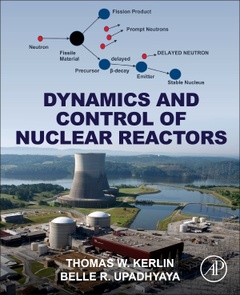Dynamics and Control of Nuclear Reactors
Auteurs : Kerlin Thomas W., Upadhyaya Belle R.

1. Introduction 2. Nuclear Reactor Designs 3. The Point Reactor Kinetics Equations 4. Solutions of The Point Reactor Kinetics Equations and Interpretation 5. Subcritical Operation 6. Fission Product Poisoning 7. Reactivity Feedbacks 8. Reactor Control 9. Space-Time Kinetics 10. Reactor Thermal-Hydraulics 11. Nuclear Reactor Safety 12. Pressurized Water Reactors 13. Boiling Water Reactors 14. Pressurized Heavy Water Reactors 15. Nuclear Plant Simulators 16. Nuclear Plant Instrumentation
Appendix A. Generation Ii Reactor Parameters B. Advanced Reactors C. Basic Reactor Physics D. Laplace Transforms and Transfer Functions E. Frequency Response Analysis of Linear Systems F. State Variable Models and Transient Analysis G. Matlab And Simulink: A Brief Tutorial H. Analytical Solution of the Point Reactor Kinetics Equations and the Prompt Jump Approximation I. A Moving Boundary Model J. Modeling and Simulation of a Pressurized Water Reactor K. Modeling and Simulation of a Molten Salt Reactor
Dr. Upadhyaya has more than 40 years of experience in teaching and research related to nuclear reactor dynamics, control, instrumentation, monitoring, diagnostics and advanced reactors. He has published more than 350 articles in refereed journals and conference proceedings, and book chapters. He is a Life Fellow of International Society of Automation, a Fellow of American Nuclear Society, a Fellow of International Society of Engineering Asset Management, and a Life Senior Member of Institute of Electrical & Electronics Engineers. Dr. Upadhyaya has now retired as a Professor of Nuclear Engineering at the University of Tennessee.
- Provides case studies and examples to demonstrate learning through problem solving, including an analysis of accidents at Three Mile Island, Chernobyl and Fukushima Daiichi
- Includes MATLAB codes to enable the reader to apply the knowledge gained to their own projects and research
- Features examples and problems that illustrate the principles of dynamic analysis as well as the mathematical tools necessary to understand and apply the analysis
Publishers Note: Table 3.1 has been revised and will be included in future printings of the book with the following data:
Group Decay Constant, li (sec-1) Delayed Neutron Fraction (bi) 1 0.0124 0.000221 2 0.0305 0.001467 3 0.111 0.001313 4 0.301 0.002647 5 1.14 0.000771 6 3.01 0.000281 Total delayed neutron fraction: 0.0067Date de parution : 10-2019
Ouvrage de 402 p.
19x23.3 cm
Thèmes de Dynamics and Control of Nuclear Reactors :
Mots-clés :
Nuclear energy; nuclear engineering; nuclear reactor; nuclear reactor design; nuclear reactor control; control principle; point reactor kinetics; subcritical operation; fission; reactivity; thermal-hydraulics; safety; Pressurized Water Reactors (PWEs); Boiling Water Reactors (BWRs); CANDU Reactors; Advanced Reactors; sodium fast reactors; molten-salt reactors; gas-cooled reactors; integral reactors; advanced liquid metal reactors; neutron kinetics; plant instrumentation; nuclear power plants; neutron kinetic equations; subcritical operation; fission product poisoning; space-time kinetics; fuel-to-coolant; heat transfer; steam generators



